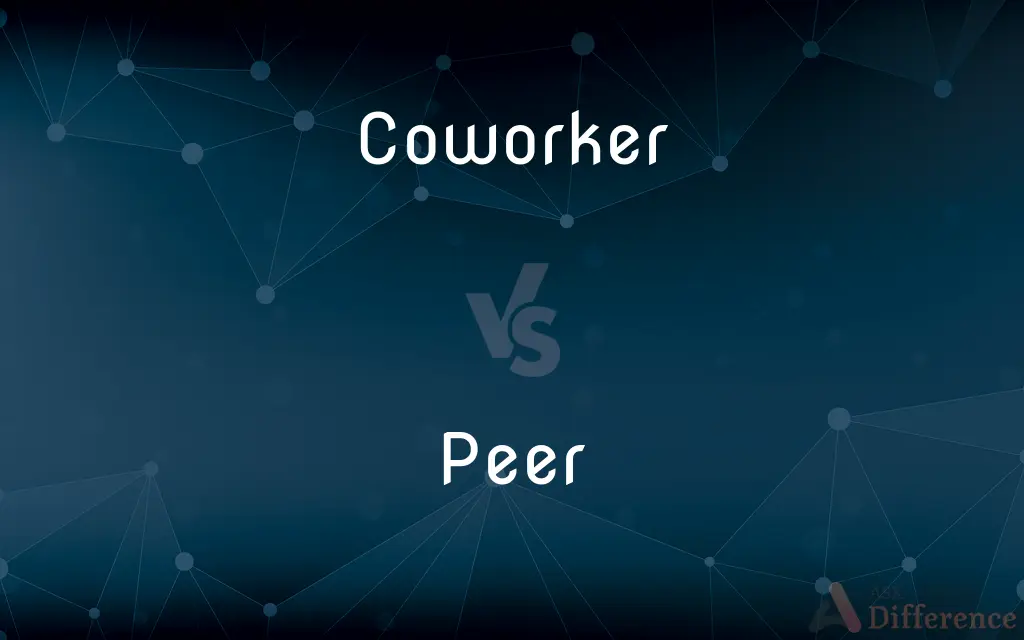Coworker vs. Peer — What's the Difference?
By Tayyaba Rehman — Updated on August 22, 2023
A coworker is someone you work with at the same organization; a peer is someone of equal rank or status, not necessarily from the same workplace.

Difference Between Coworker and Peer
Table of Contents
ADVERTISEMENT
Key Differences
A coworker is an individual with whom one works, specifically within the same company or organization. On the other hand, a peer refers to someone of the same age, rank, or ability, but they don't necessarily have to work with you.
The term coworker emphasizes a professional relationship and denotes shared tasks, responsibilities, or goals at the same place of employment. Whereas peer, while it can be used in a professional context, is broader in scope, implying an equivalence in status or standing in any area of life.
For instance, in a corporate setting, someone from a different department but the same level as you is both a coworker and a peer. However, a friend from a club or group outside of work who shares your level of expertise in a hobby is a peer but not a coworker.
Similarly, a doctor may refer to another doctor from a different hospital as a peer due to their shared profession and expertise. But they would only be coworkers if they worked at the same institution.
In education, students in the same grade level are peers due to their similar age and academic standing. If they collaborate on a group project, they can also be viewed as coworkers in that context.
ADVERTISEMENT
Comparison Chart
Definition
Someone working in the same place or organization.
An individual of similar age, rank, or ability.
Scope
Limited to professional settings.
Broad, can be used in any context of equivalence.
Relationship
Indicates a working relationship.
Indicates equivalence in status or abilities.
Interchangeability
Can be a peer, but not always.
Can be a coworker, but not limited to this.
Association
Specific to the same organization or company.
Not bound by a specific organization or group.
Compare with Definitions
Coworker
An individual employed at the same place as another.
As my coworker, Jane and I collaborate on many projects.
Peer
An individual of the same age, rank, or status.
She considered him her peer because they graduated the same year.
Coworker
Someone sharing the same work environment.
Every morning, I greet my coworker at the adjacent desk.
Peer
Someone regarded as equal in a specific domain.
In the realm of science, she was viewed as a peer by other researchers.
Coworker
A person with whom one has a professional relationship in an organization.
My coworker assisted me with the presentation.
Peer
To look intently, searchingly, or with difficulty.
Coworker
An associate in the same field of work or business.
I introduced my friend to my coworker at the company event.
Peer
A member of a particular group or category with shared characteristics.
As a poet, he was often judged by his literary peers.
Coworker
Somebody with whom one works.
He heard from a coworker that the company planned to merge those departments.
Peer
A person with similar abilities or qualifications.
He competed against his peers in the chess tournament.
Coworker
One of a group collaborating on a specific task or project.
My coworker and I are planning the office party.
Peer
To be partially visible; show
The moon peered from behind dark clouds.
Coworker
One who works with another; a fellow worker.
Peer
A nobleman.
Peer
A man who holds a peerage by descent or appointment.
Peer
A computer participating in a peer-to-peer network.
Peer
(Archaic) A companion; a fellow
"To stray away into these forests drear, / Alone, without a peer" (John Keats).
Peer
(intransitive) To look with difficulty, or as if searching for something.
Peer
To come in sight; to appear.
Peer
To make equal in rank.
Peer
(Internet) To carry communications traffic terminating on one's own network on an equivalency basis to and from another network, usually without charge or payment. Contrast with transit where one pays another network provider to carry one's traffic.
Peer
Somebody who is, or something that is, at a level or of a value equal (to that of something else).
Peer
Someone who is approximately the same age (as someone else).
Peer
A noble with a title, i.e., a peerage, and in times past, with certain rights and privileges not enjoyed by commoners.
A peer of the realm
Peer
To come in sight; to appear.
So honor peereth in the meanest habit.
See how his gorget peers above his gown!
Peer
To look narrowly or curiously or intently; to peep; as, the peering day.
Peering in maps for ports, and piers, and roads.
As if through a dungeon grate he peered.
Peer
To make equal in rank.
Peer
To be, or to assume to be, equal.
Peer
One of the same rank, quality, endowments, character, etc.; an equal; a match; a mate.
In song he never had his peer.
Shall they consort only with their peers?
Peer
A comrade; a companion; a fellow; an associate.
He all his peers in beauty did surpass.
Peer
A nobleman; a member of one of the five degrees of the British nobility, namely, duke, marquis, earl, viscount, baron; as, a peer of the realm.
A noble peer of mickle trust and power.
Peer
A person who is of equal standing with another in a group
Peer
A nobleman (duke or marquis or earl or viscount or baron) who is a member of the British peerage
Peer
Look searchingly;
We peered into the back of the shop to see whether a salesman was around
Peer
One of a group having common interests or activities.
In her dance class, she felt comfortable among her peers.
Peer
A person who has equal standing with another or others, as in rank, class, or age
Children who are easily influenced by their peers.
Peer
A look; a glance.
Peer
A comrade; a companion; an associate.
Peer
(informal) Someone who pees, someone who urinates.
Common Curiosities
Are all peers coworkers?
No, not all peers are coworkers. While peers indicate equivalence in status or standing, they may not necessarily work in the same organization or field as you.
In what contexts outside work can "peer" be used?
The term "peer" can be used in various contexts outside of work, such as in academic settings, social circles, or any situation where individuals share similar status, abilities, or experiences.
What is the main difference between a coworker and a peer?
A coworker is someone you work alongside within the same organization, while a peer refers to someone of equal rank or status, irrespective of the workplace or context.
Can you use "coworker" in an academic setting?
Yes, "coworker" can be used in academic settings when referring to individuals who collaborate on research or academic projects, even though it's more commonly associated with professional work environments.
Can a coworker be considered a peer?
Yes, a coworker can be considered a peer if they are of the same rank, status, or level as you within the organization.
Do both "coworker" and "peer" have the same origins?
No, while "coworker" has its roots in the idea of working together, "peer" originates from Latin "par" meaning "equal", reflecting their different nuances.
Is "peer review" related to the term "peer"?
Yes, "peer review" refers to the process where experts in the same field evaluate and critique one's work, emphasizing the concept of evaluation by one's "peers" or equals in expertise.
Is "peer pressure" derived from the definition of "peer"?
Yes, "peer pressure" refers to the influence or persuasion one feels from individuals of similar age, rank, or status, building on the concept of "peers" or equals in a social or age group.
Which term is broader in scope, "coworker" or "peer"?
"Peer" is broader in scope as it can be used in various contexts, while "coworker" is more specific to professional or collaborative work settings.
Can "coworker" refer to someone in a different department?
Yes, a coworker can be someone in a different department but working under the same organizational umbrella.
Share Your Discovery

Previous Comparison
Mean vs. Meant
Next Comparison
Acetate vs. EthanoateAuthor Spotlight
Written by
Tayyaba RehmanTayyaba Rehman is a distinguished writer, currently serving as a primary contributor to askdifference.com. As a researcher in semantics and etymology, Tayyaba's passion for the complexity of languages and their distinctions has found a perfect home on the platform. Tayyaba delves into the intricacies of language, distinguishing between commonly confused words and phrases, thereby providing clarity for readers worldwide.















































